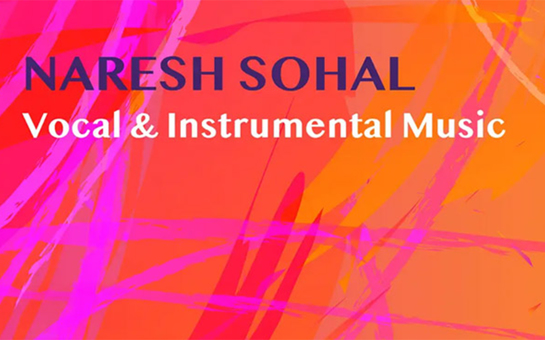







This year Buy tickets here for The Best of British
A brief history of Novello and Co Ltd
Novello 200 - Making good music accessible
Celebrating two hundred years of publishing in London, Novello will be the focus of an anniversary concert to be held in the Royal Festival Hall in Septembe. Throughout its long existence, Novello has played a central role in the formation of modern production methods and concert repertoire, and remains one of the leading international publishers of choral music to all levels of singers.
Vincent Novello
Born in 1781 of Anglo-Italian descent, Novello was a noted organist and composer as well as an avid music collector. His 1831 song The Infant’s Prayer had by the outbreak of the Great War sold over 70,000 copies. One of the founder members of the Philharmonic Society (later the RPS), he often conducted or played for the recently conceived Choral Harmonists with whom he ‘presided at the organ’ for the British premiere of Beethoven’s Missa Solemnis.
Novello believed that good music should be made accessible to all who would be enriched by it, a tenet that was to become the foundation for all his later publications and a continuing theme up to the present day. In choosing selections of great works he shaped musical tastes, at the same time consolidating composers’ reputations and, exceptionally, their music’s existence. After a fire in1829 at York Minster destroyed many Purcell manuscripts housed there, only Novello’s copies of the lost works then remained and went on to form part of the original complete edition of his works.
Early publications
All his early publications were financed by subscribers, the standard at the time, but such was Novello’s renown that among the first to donate in1811 were the Dukes of Gloucester and Cambridge, and prominent musicians including Thomas Attwood, Muzio Clementi, and Charles Burney. The first publications were collections of sacred music for church choirs from the sixteenth century onwards, including making available many masses by Mozart and Haydn for the first time in Great Britain.
These collections were designed to bring to attention neglected music in suitable formats, so Novello would arrange sections from longer works such as oratorios for use as anthems, as well as becoming the first publisher to realise keyboard accompaniments from the elitist code of figured bass.
The invention of cheap music
More than anyone, J. Alfred Novello shaped the company’s future, transforming his father’s hobby into a business of national importance, despite being only nineteen when he was put in charge. Latching on to the Victorian belief of singing as a means of social improvement, Alfred promoted choral works both new and old in series of ‘Cheap Classics’ at prices that the ordinary man or woman could afford, available even in monthly instalments. The original Novello subscriptions were 1 guinea for a large ‘folio’ edition that two or more singers could share, but Alfred’s new editions were for individuals in a ‘royal octavo’ size that soon became the standard it remains today, priced at 6 shillings and 6 pence or fewer – four times cheaper.
This led to a publishing and musical revolution that still informs concert formats and repertoire: between 1836 and 1850 Novello published the English-language editions of Mendelssohn’s St Paul, Haydn’s The Creation, and many by the most celebrated of all oratorio composers, Handel. As thousands became regular choral singers Novello could expand its catalogue and even reduce its prices: to 4 shillings in the case of the vocal score of Messiah. This, Novello’s flagship publication, sold 20,000 copies in its first three years and has continued to be a choral favourite ever since, regularly appearing as one of the top ten pieces performed worldwide, above all in the scholarly editions of Ebenezer Prout and Watkins Shaw.
Revitalising British Music
With the emergence of choral singing as a national activity, many British composers turned their hands to more ambitious cantatas and oratorios. Alfred Novello first ran competitions for new British partsongs in the 1850s and soon began publishing larger choral works that, although mostly now forgotten, successfully served a public need at the time. It would take a generation of encouragement before Britain produced composers whose work would survive and be ever more widely performed, but Novello continued the search for excellence and found it in Hubert Parry, John Stainer, Charles Stanford, Arthur Sullivan, and above all, Edward Elgar.

Novello’s close involvement with top British institutions like the Crystal Palace and Three Choirs Festivals allowed the promotion of the catalogue and led to many important premieres. Some have said Parry’s Prometheus Unbound first performed in 1880 marked the start of modern British music, and his Blest Pair of Sirens brought huge acclaim in 1887, the same year that Stainer’s The Crucifixion received its premiere. These and Elgar’s oratorios, The Dream of Gerontius, The Apostles, The Kingdom, The Music Makers and others, became standard works in the choral repertory, joining the likes of Handel and Haydn in a manner unimaginable for British music even fifty years before.
The twentieth century saw a shift in popularity towards orchestral music, led by Elgar with his Enigma Variations and Symphony No 1, with other important contributions from Arthur Bliss, E.J.Moeran, Hamilton Harty and Granville Bantock. Novello’s place in British society has produced three Masters of the King’s/Queen’s Music – Elgar, H. Walford Davies, and Bliss – as well as producing and printing the Order of Service for all four royal coronations since 1900.
Diversifying the musical landscape
As well as encouraging British music, Alfred Novello and his successor Henry Littleton shaped musical tastes by publishing Continental composers now ubiquitous but then were much less well known. These included works by Schumann, Berlioz, Verdi and Wagner, as well as commissions from Dvorak, Gounod, Mendelssohn and Saint-Saëns.
One way of promoting new works, both British and Continental, was to set up your own choir and concert series, which Novello’s did in 1867 under the leadership of Joseph Barnby. They performed lesser-known pieces such as Handel’s Jephtha, works by Mendelssohn and through this association presented the UK premiere of Bach’s St Matthew Passion (in English) in 1871. Given the success of these concerts, a new series began in November 1874 presenting daily concerts (except Sundays) with a different theme each day: Monday ‘Ballad’, Tuesday ‘English’, Wednesday ‘Classical’, Thursday ‘Oratorio’, Friday ‘Wagner’, Saturday ‘Popular’. It was revolutionary in size and a clear forerunner to the Proms, but a ludicrous business venture and inevitably reduced after seven weeks to two concerts per week, ending altogether in May 1875.
Outside the concert hall, Novello encouraged the growing church choir and organ movement. The leading hymn collection,
Novello’s newspapers
In 1836 Alfred Novello began publishing the first periodical of its type, The Musical World. It was devoted entirely to music, containing reviews of concerts and new works, an event diary, general articles on the state of music, and supplements of a short piece of music. The audience was the inquisitive amateur, a fast-growing group in Victorian society, and the paper set a trend of publications which would reach its height in The Musical Times, bought by Novello in 1844. Its influence was extensive and can be shown in one example: the November 1877 issue included a new arrangement of part of Mendelssohn’s Festgesang with words adapted from Charles Wesley – ‘Hark! The Herald Angels Sing’.
In 1892 Novello launched The School Music Review, aimed at school teachers and containing invaluable information on music teaching as well as many editions of folksongs. Continuing well into the twentieth century, the ‘School Songs’ series from the collected supplements comprised over a thousand pieces. Other publications produced by Novello’s own periodicals department for much of the twentieth century included The Strad and Music in Education.
The modern age
Throughout its history, education in its broadest sense has informed much of the repertoire of Novello and, in the twentieth century, become a major market in itself. Series by Eta Cohen and Trevor Wye have achieved lasting popularity amongst teachers of violin and flute, and in vocal music the ‘Little Voices’ and ‘Novello Primary Chorals’ series provide popular song arrangements with extra materials for the non-specialist teacher. ‘Pop’ cantatas by Joseph Horovitz and Michael Hurd continue to inspire singers of all ages.
After joining the Music Sales Group, Novello has enjoyed an increased international presence through its sister companies and has been able to focus on providing choral music for all areas of society. Far from being solely a publisher of old music Novello is committed to promoting the music of today’s composers, many of whom have become an integral part of the country’s musical life, including Malcolm Arnold, John McCabe, Richard Rodney Bennett, Thea Musgrave, Judith Weir, as well as the Finnish composer Aulis Sallinen.
Looking back over two centuries, Novello has played a crucial role in encouraging the public’s affection for music both old and new as well as shaping the role of the modern publisher, one that is still changing with successful movements into online sheet music sales and digital media.
Please click here for more News






